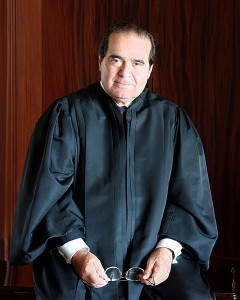
By Collection of the Supreme Court of the United States (Antonin Scalia – The Oyez Project) [Public domain], via Wikimedia Commons
Scalia fears that what constitutes the “evolving standards of decency” are decided too much by the legislature whose members constantly monitor and respond to the views of the public in order to stay in office. For example, history has shown that the Supreme Court made one of its worst decisions when it paid too much attention to society’s “progress” and—succumbing to the will of the executive branch, Congress, and a war-scared public—upheld the internment of Japanese Americans during World War II in Korematsu v. the United States. (Interesting fact: the author of one of the dissents Justice Robert Jackson later led the American prosecution team at the Nuremburg trials of Nazi war criminals.)
So, how can one interpret the Constitution and at the same time insulate it from the rapid decay that it can sometimes suffer in the name of “progress”? Consider this simple example: when interpreting a written contract to apply to a situation not expressly covered by its terms, one does not look to how “society” would interpret the document, but rather to the intent of the parties who wrote the contract originally. In Scalia’s words, there is no other place to look in interpreting the Constitution than to the meaning of its terms as understood to those who wrote it: the Founders.
Recently, Scalia has had no problem in applying his Founder-centric philosophy to new, real-life situations that arise with the use of new technologies. In United States v. Jones, Justice Scalia found that the warrantless placement of a GPS device on the defendant’s car to violate the Constitution’s prohibition on unreasonable searches and seizures. He likened the police conduct in Jones back in time to an officer of the British crown concealing himself in the back of a horse and buggy of a colonist suspected of wrongdoing in order to monitor his activities. Justice Scalia reasoned that the placement of the GPS device, like the concealment of the British officer, was just the type of trespass our Constitution was written to prevent.
Who interprets the Constitution? As Justice John Marshall said in the landmark decision of Marbury v. Madison, it is the Supreme Court’s role to say what the law is, which sometimes includes telling other branches of government that they’ve broken it. To Scalia it is not society’s or the legislature’s job to nurture the Constitution and ensure that it stays in-step with our “evolving” standards of decency; rather, it is the job of the Supreme Court (and the lesser judges who are called upon to interpret it) to resurrect it from the lifeless pages of the countless books upon which it is written and apply it, where appropriate, to shield those upon whom the government has intruded.
When should the Constitution be interpreted? For those of us who are waiting for the Supreme Court to apologize for Korematsu (the judicial branch is the only branch to not yet do so), do not hold your breath. The power of the judicial branch, at least according to the terms of the Constitution, only applies to cases and controversies arising under its terms and the other laws of the United States. In other words, the Supreme Court deals with real people and real problems or injuries. It does not issue advisory, preemptory, or, in this case, corrective opinions. The only chance for an apology will be if “society’s evolving standards of decency” again call for the internment of another group of people, at which point Korematsu would surely be overruled—assuming of course the Constitution is given the meaning with which it was originally written.






